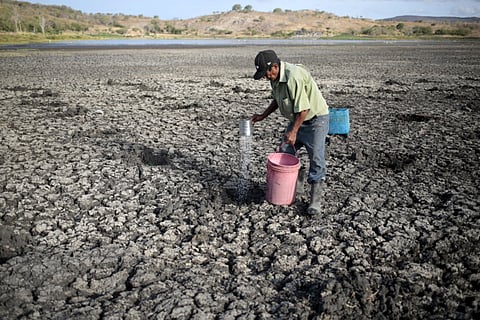Flowing towards an unemployment solution
GCC countries need to focus on promoting regulations that protect clean water and create decent and green jobs at the same time

Water is the most precious natural asset on earth. Availability of water resources in the right quantities and quality means life and sustainability. On March 22 every year, the world celebrates the World Water Day (WWD). It is a global event that puts the spotlight on themes related to water issues. Every year, WWD focuses on a specific theme or topic that is relevant to water issues.
The theme of the 2016 WWD is “Water and Jobs”, which is a great opportunity to discuss the importance of water in creating green and decent jobs, which promote sustainable development.
WWD 2016 is a crucial day for the Arab world in general and the GCC in particular. According to the World Bank, The Arab World is home to 6% of the world’s population and less than 2% of the world’s renewable water supply. For instance, all GCC falls among the world’s most water scarce countries in the world.
Most Arab countries suffer from water problems such as scarcity, pollution, and poor quality. The average annual rainfall in the Arab World in general is below 250mm in 70 per cent of the region and less than 100mm in the GCC.
On the other hand, today according to UN, almost half of the world’s workers - 1.5 billion people - work in water related sectors and nearly all jobs depend on water. There are direct and indirect water related jobs. The direct ones are those related to irrigation and agriculture, water maintenance, desalination, water treatment, water science and research, and many other water engineering jobs.
The indirect ones include nearly almost all other types of work related somehow to water such as tourism, transportation, health care, construction, steel, manufacturing and food industries, and so on.
Many Arab countries are facing a major challenge in the increase in youth unemployment. According to World Bank data, the total percentage of unemployed youth population in the Arab countries reached 23.8 percent in 2014. The rapid growth in population will boost the demand for water as consumption rises steadily. In addition, many water resources will dry up due to climate change, rapid urbanization, and industrialization.
GCC countries need to solve water issues to solve many other related issues, including youth unemployment. Besides investment in water infrastructure, there is a need to develop precise policies and strategies in this regard. GCC countries need to focus on promoting regulations that protect clean water and create decent and green jobs at the same time.
It is worth mentioning that each government can decide on the best type of water-related jobs it can focus on based on its needs, human resources, and comparative advantage in this field. In this regard, one must point out that agriculture is not the favorable sector as thought for many years. In fact, on average, agriculture consumes around 89 percent, industry 6 percent and household 5 percent of water supplied. However, the agriculture sector share in GDP in 2015 was 2.3 percent in Saudi Arabia and as low as 0.1 percent in Qatar, 0.3 percent in Kuwait and Bahrain, 0.6 percent in the UAE, and 1.4 percent in Oman. In contrast, the industry sector’s share of GDP in the UAE and Saudi Arabia, for instance, was 61.6 percent and 46.9 percent respectively. While the services sector share of GDP was 38.2 percent in UAE and 50.8 percent Saudi Arabia.
UAE is a pioneer in this regard, while the unemployment rate, according to the world bank data, was 3.6 percent of total labor force, the “Emirates Vision 2021” aims to develop and improve Emirates youth to make the United Arab Emirates and one of the best countries by 2021.
To achieve this many initiatives were launched in various sectors in the recent years such as the “Academy of Dubai Electricity and Water Authority secondary” for training and development of young skills in various technical fields and professionals covering various fields of industry generating, transmission and distribution of electricity and water desalination.
Also, in 2016 according to Water and Electricity Authority of Abu Dhabi “the Emiratization of the workforce is on the top of strategic priorities to develop the Abu Dhabi Vision 2030”. Providing technical and vitality jobs in the water and electricity is key aspect to realize this vision.
Thus, governments of the region can seize this important occasion of WWD and launch and promote a plan for investment and opportunities in water related businesses. This is the right time, if we take into consideration the current low oil prices and the need to diverse investment in non-oil sectors. Such a plan can help creating many green jobs, a necessity to reduce unemployment, and at the same time aid in solving water problems. The water problem in the GCC region is not only an environmental issue, but also an economic, social, and security issue.
Dr Mohammad Abdel Raouf is an Independent Environmental Researcher.



